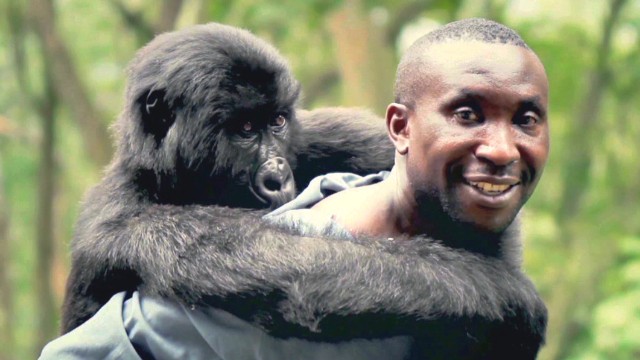
Virunga National Park is where worlds collide. Lush green hills, anti-government rebels, poachers (and anti-poaching rangers), an oil company, endangered gorillas, and – oh yes – locals just looking for a little bit of economic development.
They all come together in one of the most beautiful places on earth, in the heart of Africa, in eastern Democratic Republic of Congo, on the border with Rwanda.
The fight to protect the park, which is a UNESCO World Heritage site, is the subject of a new documentary, “Virunga.”
“What's happening in Virunga is an urgent, precedent-setting case,” director Orlando von Einsiedel told CNN’s Paula Newton, in for Christiane Amanpour, on Wednesday.
Only 0.05% of the world’s surface is considered “protected,” he said.
“If we can't defend that tiny percentage of the world's surface, what chance do we have to defend the Great Barrier Reef, or Yellowstone National Park, or Yosemite?”
The danger was highlighted just last week when chief park warden Emmanuel de Merode, a central player in the film, was shot and nearly killed by unknown gunmen in Virunga.
“We've been in daily contact with Emmanuel,” von Einsiedel said. “He's doing okay. He's recovering at the moment in hospital.”
“Over 140 [Virunga park rangers] have been killed in the last 15 years, trying to defend the park. And the reason they do this is because they know the potential this park has to transform the region.”
In neighboring Rwanda, he told Newton, tourism generates half a billion dollars; Virunga, he said, could easily do the same.
And a plan to produce hydroelectric power, he said, “could provide electricity and jobs for thousands and thousands of people.”
“Virunga really is a very stabilizing force in the region. And it's a really – it's an example of a strong functioning government institution.”
The park has “incredible natural resources that can drive a sustainable development,” he said.
That does not seemingly extend itself to the current oil exploration he alleges is going on in the park.
“There is a British oil company called SOCO International, and they are illegally exploring for oil in the Virunga National Park,” he told Newton.
DRC has allowed SOCO to explore for oil, but there is a dispute over whether it is going beyond its mandate.
“Over two years, we did an investigation into what they're doing. And we've got concerns about the behavior of their employees, their subcontractors, their supporters with regards to bribery and corruption, links to armed groups, and human rights abuse.”
In a statement, SOCO called the film’s allegations “unfounded and inaccurate.”
“It is important to note that the film has been produced by one of the company's detractors,” the statement reads, “and is therefore not an objective portrayal of the facts surrounding SOCO’s operations. SOCO understands the film misrepresents the scope and location of the company's activities.”
Newton asked von Einsiedel whether it is a “tough sell” to convince locals, looking for hard-fought economic growth, that their ability to explore for natural resources should be any different than anywhere else in the world.
“Well, I believe that this is a very, very special place and it's a precedent setting place,” he said. “And that's why it's so important to protect it.”
“This is a park with incredible biodiversity, and it's also home to some of the world's last mountain gorillas.”
“The park's resources can last forever if they're managed effectively. And that will go on to benefit, you know, the tens of thousands of people that live around the park.”
No comments:
Post a Comment